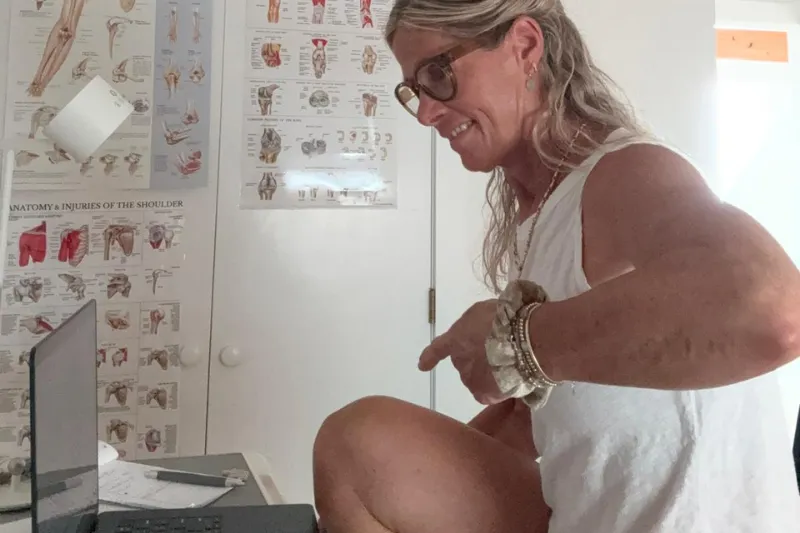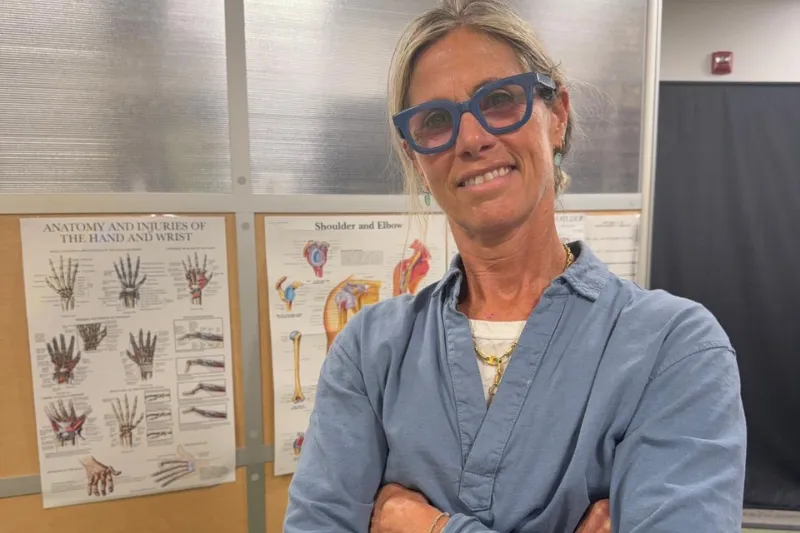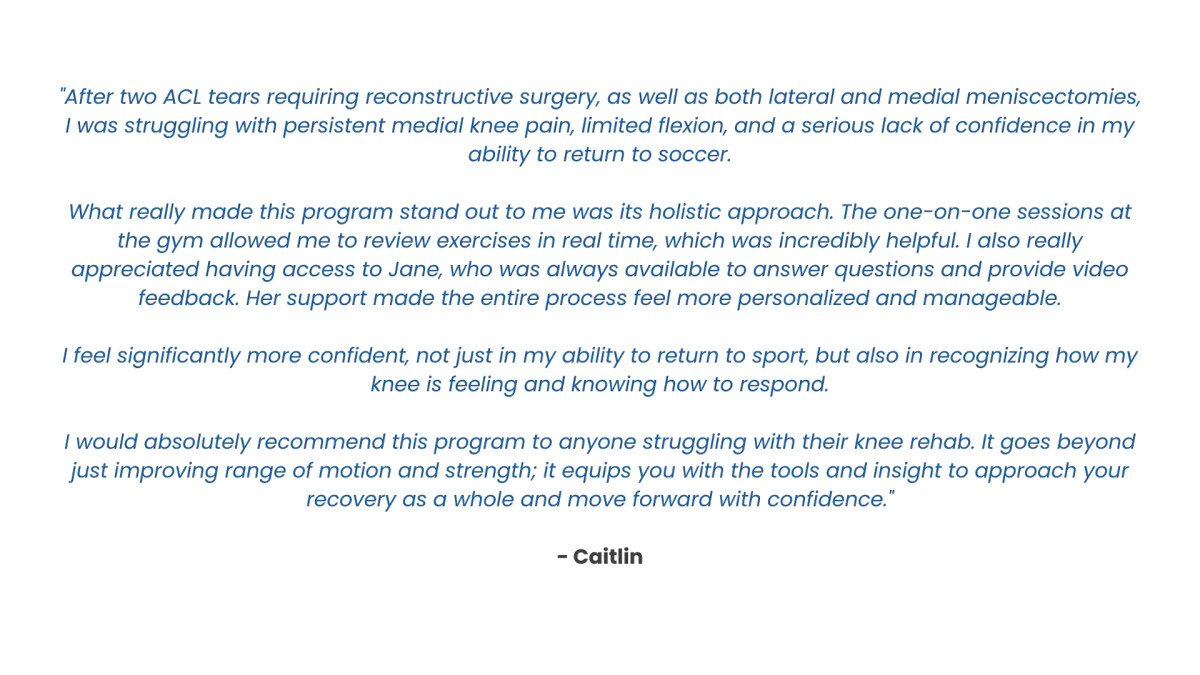Welcome to
Functional Balance
Where Restoring Movement Patterns & Lifestyle Habits Optimizes Musculoskeletal Healing.


🌿 Where Science Meets Real-Life Solutions for Women in Motion
Navigating the crossroads of musculoskeletal pain, hormonal shifts, and stubborn symptoms like; weight gain, brain fog, fatigue, sleep disturbance, and strength loss can feel daunting without support.
At Functional Balance, we specialize in helping busy women in their 40s and 50s regain control of their mobility, energy, and long-term health—without endless guesswork, quick fixes, or invasive procedures.
✨ You’re in the right place if:
Your knee pain is recurring and affects your ability to stay active
You're noticing unwanted changes in mood, sleep, or metabolism
You've tried physical therapy or exercises without progress
You're too busy to waste time chasing solutions that don’t last
You want to feel capable, energized, and strong—for life
What We Do
Functional Balance Method:

Knee Rescue Formula
Self-paced online coaching program with expert guidance

One-on-One Remote Coaching
1:1 support and community calls to personalize your path

In-Office Physical Therapy
Hands-on clinic care to get you moving pain-free
No more bouncing between practitioners or band-aid treatments.
You deserve care that is as dynamic and intelligent as you are.

About Jane
I’m Jane Eliasson, a licensed physical therapist (PT) and Functional Nutrition & Lifestyle Practitioner (FNLP), with 30+ years of experience helping active people of all ages restore strength and vitality. My evidence-informed approach uncovers root causes, refines movement patterns, and optimizes lifestyle habits to promote lasting health without over-reliance on pharmaceuticals, invasive procedures or unnecessary surgeries.
I specialize in guiding women through their 40s and 50s—with orthopedic problems- particularly knees, while going through hormonal shifts—by blending science-based physical therapy with functional medicine.
Testimonials
FAQ
Why do I keep having the same injury or pain over and over again?
Recurring pain or injury often comes from underlying movement patterns, muscle imbalances, or poor healing at the tissue or nervous system level. Even after the initial pain subsides, if the root cause—like poor joint control, weak stabilizers, or inflammation—isn’t addressed, the cycle repeats. Our approach blends movement retraining with nervous system input, nutrition, and lifestyle strategies to break the pattern and promote lasting healing.
How long does it take to recover from a musculoskeletal issue?
It depends on many factors—how long you’ve had the issue, how severe it is, your age, sleep quality, stress, nutrition, and even hormone status. Some people feel better within a few weeks. Others, especially with chronic issues, may need a few months. Real recovery is possible when we treat the body as a system, not just a joint.
What’s the difference between strengthening and re-training my movement?
Strengthening focuses on building muscle power and size. But if your body isn't using the right muscles at the right time, you’re strengthening a compensation pattern. Movement retraining restores coordination between your brain, joints, and muscles—so the right muscles activate when they should. It’s the foundation of true stability and long-term strength.
Can nutrition or lifestyle really impact my joint or muscle pain?
Yes—more than most people realize. Poor sleep, chronic stress, blood sugar imbalance, dehydration, or a pro-inflammatory diet can delay healing and increase sensitivity to pain. We use functional medicine principles to support recovery from the inside out—because a well-fed, well-rested body heals faster and holds onto results longer.
Is it safe to exercise with joint pain or instability?
Yes—but only if it’s the right kind of movement. Certain exercises can help reduce pain by improving blood flow, neuromuscular control, and joint nutrition. Others may make symptoms worse if the mechanics are off. That’s why our programs focus on restoring control first, then gradually progressing to strength and performance.
Why hasn't physical therapy worked for me in the past?
Many traditional approaches focus only on the local area of pain and may miss contributing factors like poor movement patterns, systemic inflammation, or lifestyle stressors that block healing. Our integrative approach combines orthopedic PT with a functional lens—looking at the full picture of why healing isn’t happening, and guiding you through a personalized path that addresses both body mechanics and whole-body support.
How do hormones affect my joint or muscle pain?
Hormones like estrogen, cortisol, and insulin play a major role in tissue repair, inflammation, and muscle recovery. During perimenopause, many women experience joint stiffness, muscle loss, or new injuries due to shifting hormone levels. That’s why we integrate hormone-supportive strategies into the recovery plan—so you’re not working against your biology, but with it.
Why does it seem harder for me to lose weight than anyone else?
Weight loss resistance is often more than just "eating right" and exercising. Factors like chronic inflammation, hormonal imbalance, high stress, sleep disruption, and metabolic shifts during midlife can make fat loss more difficult. We address these root causes through a whole-body approach to restore balance and improve metabolism naturally.
Is alcohol really that bad for me? How much is too much at this time?
Alcohol can interfere with sleep, hormone regulation, liver function, and inflammation—all of which are critical to healing and weight balance. Occasional use may be fine for some, but regular or heavy drinking can stall progress. For midlife recovery, many benefit from cutting back to 1–2 drinks per week or avoiding it altogether.
What about sugar? Everything on social media seems to conflict. Is it really that bad?
Not all sugar is created equal—but in general, excess added sugars contribute to inflammation, hormonal imbalances, and blood sugar swings that affect pain and mood. You don’t need to be perfect, but being mindful of how much and how often you consume sugary foods can make a big difference in your overall health.
Could it be that my weight-gain, knee issues, and mood-swings are all interconnected?
Yes—and that’s exactly why we take an integrative approach. Hormonal shifts, inflammation, gut health, stress, and movement all affect each other. What may feel like separate issues is often one interconnected pattern—and by supporting your system as a whole, we help restore balance across the board.

Ready to get off the pain cycle?
Join the thousands of women reclaiming their strength, stability, and confidence.
🎯 The Knee Rescue Formula — A proven system to repair movement, reduce pain, and rebalance your whole body.
I put together an in-depth 30 minute masterclass about how to program works along with some remarkable transformations.
Click the button below to register for free today!
FREE RESOURCE:
5 Shifts to End Knee Pain and Regain Balance




